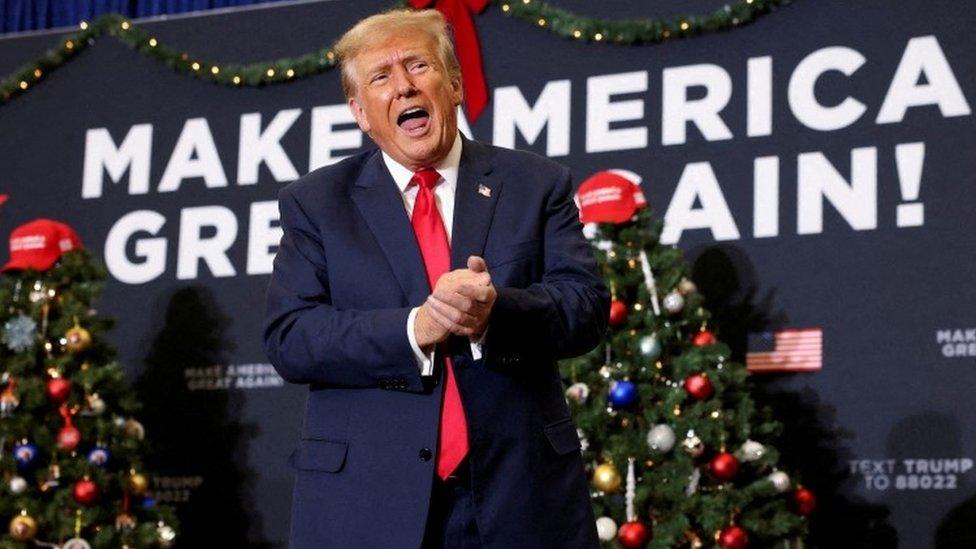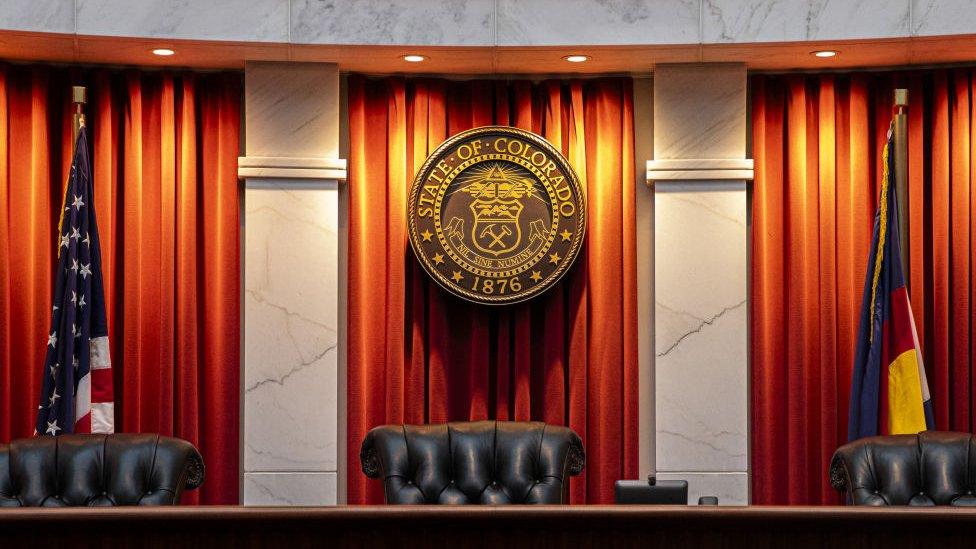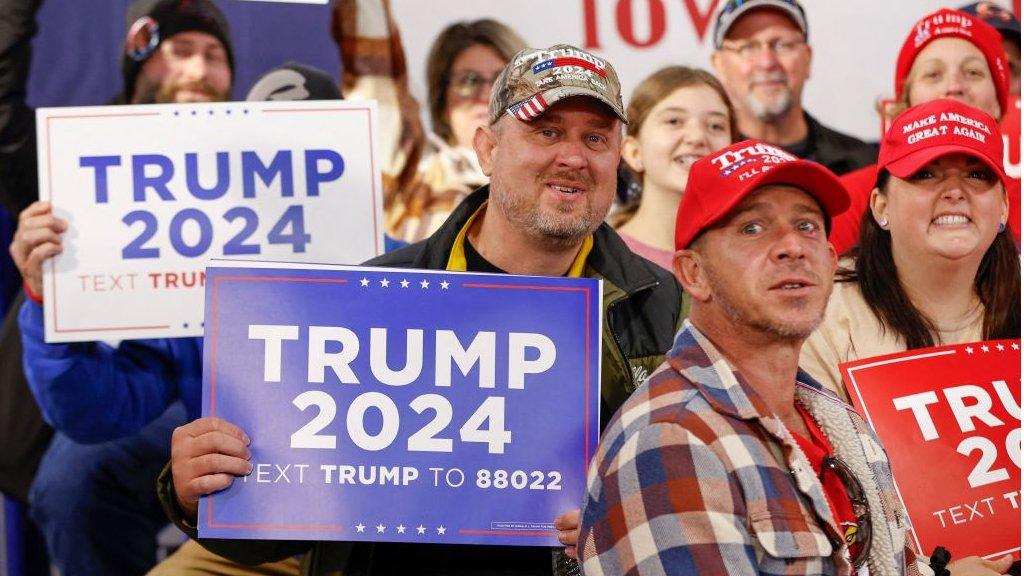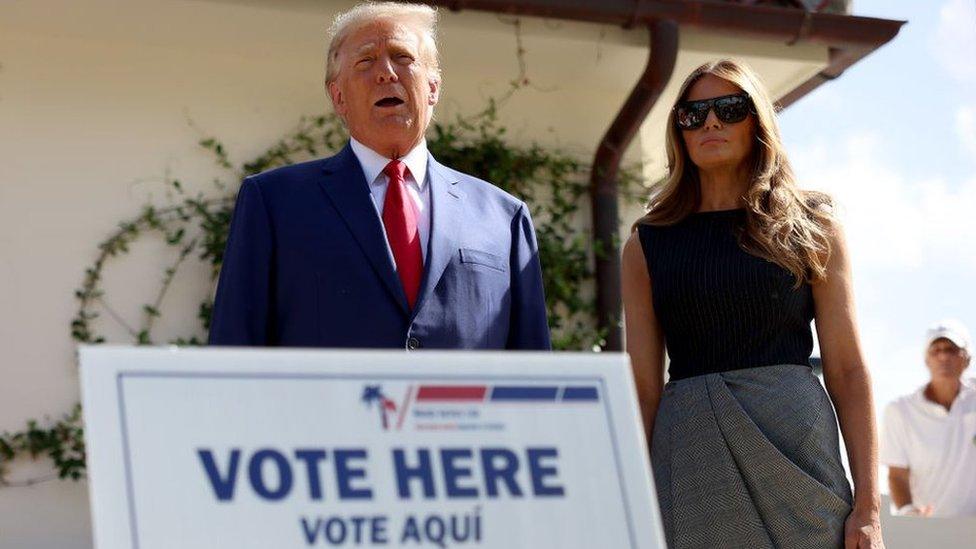Trump election: Michigan supreme court rejects ballot disqualification bid
- Published

Mr Trump's place on the ballot in Michigan was never thought to be in danger
Michigan's Supreme Court has refused to hear an appeal by voters in the US state to disqualify Donald Trump from next year's presidential primary.
They sought to invoke a clause in the US Constitution, barring anyone who has engaged in insurrection, over Mr Trump's role in the 2021 Capitol riots.
The decision comes days after Colorado became the first state to rule that Mr Trump was not an eligible candidate.
Michigan is considered a battleground state in the 2024 general election.
Traditionally voting Democrat, Michigan narrowly supported Mr Trump, a Republican, in his successful 2016 presidential campaign. But the state reverted to the Democrats when Joe Biden carried it by a margin of nearly 3% in 2020.
Unlike in Colorado, the Michigan bid failed early on in the process, and the appeal to the state's supreme court was seen as having little chance of success.
Mr Trump praised the decision on Truth Social on Wednesday, calling it a "pathetic gambit to rig the Election". The ruling means that his name will appear on the ballot for the Republican primary, set to be held on 27 February.
Pro-democracy advocacy group Free Speech for People filed the lawsuit in September, and the group said in a statement that the ruling was a narrow and technical one that applied only to the state's Republican primary.
"However, the Michigan Supreme Court did not rule out that the question of Donald Trump's disqualification for engaging in insurrection against the US Constitution may be resolved at a later stage," said Ron Fein, Free Speech For People's legal director.
Lower courts in Michigan rejected the case on procedural grounds and did not examine the question of whether the Capitol riot 6 January 2021 qualified as an insurrection under the law and whether Mr Trump played a part in it.
Supreme Court Justice Elizabeth Welch explained that Michigan's laws were different from Colorado's.
The appellants "have identified no analogous provision in the Michigan Election Law that requires someone seeking the office of President of the United States to attest to their legal qualification to hold the office", she wrote.
Colorado's 4-3 supreme court decision last week, which refers only to the state's Republican primary on 5 March, does not stop Mr Trump from running in other states.
In the Colorado case, a lower court judge ruled that Mr Trump fell afoul of Section 3 of the US Constitution's 14th Amendment which bars officials "engaged in insurrection or rebellion" from holding federal office.
It was the first instance of the Constitution being used to disqualify a presidential candidate. The amendment was ratified after the American Civil War to block Confederate secessionists from returning to power after southern states re-joined the Union.
But legal experts say the ruling will have a tough time standing up when, as expected, it reaches the conservative-leaning US Supreme Court.
Jocelyn Benson, Michigan's secretary of state - a position that among other things oversees elections - said the legal issues raised by the 14th Amendment were not clear cut.
Ms Benson, a Democrat, also said she believed the questions should ultimately be resolved by the US Supreme Court.
"I continue to hope they do this sooner rather than later to ensure that we can move forward into 2024's election season focused on ensuring all voters are fully informed and universally engaged in deciding the issues at stake," she said.
The Colorado decision has been put on hold pending an appeal deadline in January. Similar attempts to kick Mr Trump off the ballot in New Hampshire and Minnesota have failed.
Also on Wednesday, Mr Trump's lawyers urged Maine's secretary of state to recuse herself from a 14th Amendment bid to kick Mr Trump off the ballot in that state. In Maine, ballot challenges are heard by the secretary of state at first instance, not the courts.
Mr Trump's campaign have claimed that Shenna Bellows, a progressive Democrat, is biased against him. Citing tweets she sent in the aftermath of the 2021 Capitol riot, they claimed she had "already passed judgment on the Challengers' core assertions".
Ms Bellows is expected to issue her ruling in the coming days.
Watch: Trump says indictments are "badge of honour" at campaign event following his removal from Colorado ballot
Related topics
- Published26 December 2023

- Published20 December 2023

- Published8 February 2024

- Published21 December 2023
